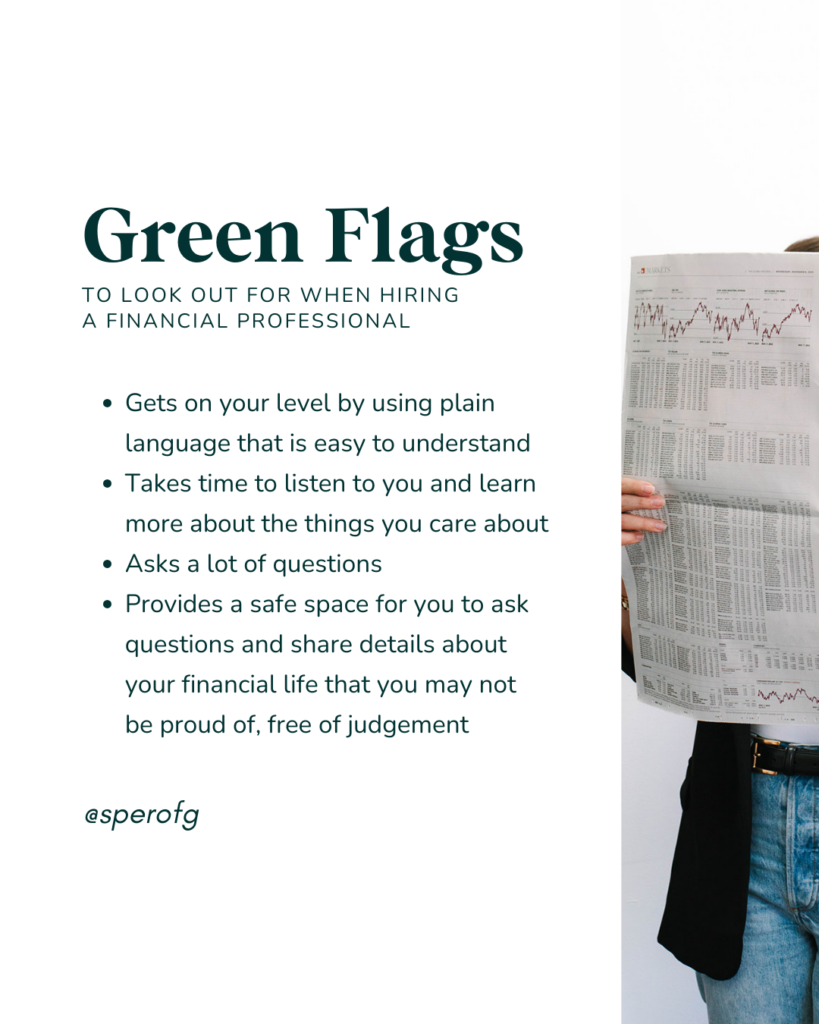Not all financial professionals are the same.
With more than a decade of experience in the industry I have learned that perhaps one of the most difficult steps can be finding a professional who is right for you. I’ve spoken with many people who want professional guidance but are reluctant either because they feel embarrassed by their own personal lack of financial knowledge, or they worry that the person they hire won’t properly address their needs. My goal for this article is to help you overcome some of the barriers to seeking financial help and to provide you with the knowledge and confidence to choose the financial professional that is right for you.
1 | Know What You’re Looking For
First and foremost you need to have an idea what it is you want help with. Not all financial professionals offer the same services so having a list of what you need will help to narrow down your options and get you one step closer to that right fit.
- Investment Advisor: Offers advice targeted towards making investment decisions, like portfolio allocations and how much you’ll need to save (and at what rates) to meet your goals.
- Insurance Advisor: Offers advice and recommends specific life and health insurance policies to help you manage the financial risk of a prolonged illness or disability, or (I hate to say it) death.
- Financial Planner: Advises on a multitude of financial matters like paying off debt, funding big purchases, achieving financial independence, or planning for retirement. (Some planners specialize in a particular area while others write plans designed to help you juggle alllll of the priorities.)
To get started, make a list of your goals or things you would like help with. Then, search financial professionals in your area using keywords from your list, and check their websites to see if their services match what you’re looking for. If you don’t see your needs reflected on their website, chances are you are not that firm’s target client and it’s best to move on. When in doubt don’t be afraid to inquire. Most firms have an inquiry form right on their website (here’s ours). You can also try asking friends or family for recommendations.
2 | Check Credentials
Now that you have an idea of who you’d like to hire, the next step is to make sure they’re qualified. This is done by confirming that they are properly licensed and have credentials that are up-to-date.
Financial planners tend to have the most education as they need to possess a high level of knowledge not just on one subject, but rather a wide range of issues in order to develop financial plans for their clients. In Canada, the CFP and QAFP are considered to be the gold standard of financial planning designations.
The term “financial advisor” is typically used to describe professionals who specialize in and are licensed to sell and advise on a specific financial product, for example mutual funds, securities, or life insurance.
It’s important to verify a prospective advisor/planner’s credentials to check if they’re able to provide advice in the areas you need help with but also to confirm they have the proper education and experience. Unfortunately in most of Canada there are no set standards for who is allowed to call themselves a financial advisor or financial planner and as a result one cannot assume somebody is qualified based on their professional title alone. As of now, only Ontario, Saskatchewan, and Quebec have minimum education standards and approved designations that dictate who can call themselves a financial planner or advisor, but other provinces are in talks about implementing their own legislation. Fortunately, confirming someone’s qualifications isn’t hard to do. Most professionals list their credentials on their website, email signatures, and business cards, and you can also find licensing directories on most governing body websites.
Here is a list of the most commonly recognized designations in Canada, by profession:
- Investment Advisor: Licensed to sell financial products such as mutual funds, securities, or ETFs.
Might also have one of the following investment advisor credentials: Chartered Investment Manager (CIM®), Professional Financial Advisor (PFA™), Registered Retirement Analyst (RRA®).
- Insurance Advisor: Licensed to sell life and health insurance products, segregated funds, and annuities.
Might also have one of the following insurance advisor credentials: Chartered Life Underwriter (CLU®), Professional Financial Advisor (PFA™).
- Financial Planner: Have completed one of the following education programs: Certified Financial Planner (CFP®), Qualified Associate Financial Planner (QAFP™), Personal Financial Planner (PFP®), Registered Retirement Consultant (RRC®), CFP® is the most rigorous and considered the gold star of financial planning designations.
At the end of this article, you’ll find links to directories of some of the most widely recognized credentials.
3 | Ask the Right Questions
Once you’ve narrowed down your options to a final few, it’s time to conduct some interviews. To ensure you’re getting a complete and accurate picture, you’ll want to come prepared with a list of questions. Here’s a list to help you get started:
Financial Planner:
- What type of planning do you specialize in?
- Do you charge a flat or hourly rate?
- (if flat rate) What’s included for this price? (Plan only? Help implementing recommendations? Check-ins?)
- (if hourly) How many hours should I expect to be charged? How can we make sure to stay within my budget?
- Do you have a sample plan that I could review?
Investment Advisor:
- What type of investments do you provide?
- Do you offer options from a variety of institutions or just one?
- Do you have a minimum investment threshold?
- Will the level of service I receive depend on how much I invest with you?
- What is your investment philosophy?
- How much should I expect to pay in fees?
All Professionals:
- What are your qualifications?
- How much experience do you have?
- How many clients do you have?
- Who is your ideal client?
- How often will you check in with me?
- What does your process look like?
- What systems do you use to measure our progress towards my goals?
- How do you get paid?
Not all professionals get paid the same way. Some charge a fee for their advice, while others get paid once they sell you a financial product.
Here is how each profession typically gets paid:
- Investment Advisor: Receives a commission on the sale of financial products such as GICs or annuities
As a percentage of assets under management (fee-based).
- Insurance Advisor: Receives a commission on the sale of insurance policies or annuities.
As a percentage of assets under management (for segregated funds).
- Financial Planner: Fee for advice: Charges a fee directly in exchange for time and expertise.
Can also adopt a fee-based or commission-based structure if they are also licensed to sell insurance or investments.
So how do you know which fee structure is right for you? It all goes back to what you’re looking for. If you have a specific need such as life insurance to cover a mortgage, or mutual funds to invest your RRSP, you might be fine hiring a qualified advisor to guide you through the purchase and management of these products and receive a management fee or commission in return. On the other hand, if you need advice that is not tied to the sale of a particular product, you’re probably better off hiring a financial planner who charges a direct fee for their advice. It might cost you a little more upfront, but it will help to ensure the recommendations you receive are free of bias. Let me give you an example:
Ajay recently changed jobs and his former employer sent him a list of options for what to do with his company pension plan. The options were:
a) Leave his pension intact and receive an income when he retires
b) Transfer the value to his new employer’s pension plan
c) Take the value of his pension (approx. $500,000) and invest it himself
Ajay decides to seek some professional guidance to help him with this decision. He interviews two professionals, a financial planner and an investment advisor. The financial planner offers to do an analysis comparing Ajay’s options and provide him a written report of her findings, including a pro/con list and final recommendation. She estimates this will take her about two hours and quotes him $450 based on her hourly rate of $225. The investment advisor offers to provide the exact same service, but for free. Ajay asks the investment advisor how they get paid to do free work and learns that they would only get paid if he goes with Option C and invests his pension with them. Ajay is now wondering if the advisor might be inclined to recommend Option C even if it is not what’s best for him. Ajay decides he’d rather pay the financial planner since the potential cost of making the wrong choice far outweighs the cost of planning fees.
Financial plans can be expensive but contrary to popular belief, qualified advice doesn’t have to cost thousands of dollars. Here are some alternatives to shelling out for a traditional financial plan:
- Some financial planners will let you hire them for one or two meetings at their hourly rate to offer tips and make sure you’re on the right track
- Some financial planners also manage investments and offer planning services to clients who invest with them.
At Spero, we offer both of these options PLUS our Financial Health Assessment, which is a free tool to help anyone and everyone looking to take their money management to the next level, regardless of budget. All you have to do is answer a few questions and a licensed financial planner will review your information and send you back a video with tips and tricks to boost your financial health and wealth all on your own. No meetings, no sales pitches.
Finally, if you’re not comfortable asking questions face-to-face, don’t be afraid to send your list in an email. A good advisor/planner will not take offense and will happily answer all of your questions. If you do get a negative reaction consider this a big red flag and move on.
4 | Trust Your Gut
Regardless of your preferred method of communication, you’re going to want to meet with your prospective advisor/planner at least once before you hire them; the main reason being so you can get a feel for how they carry themselves and determine whether or not you would feel comfortable opening up to them. Most of the time one meeting should be enough to give you an idea of whether this person is someone you would like to work with. That said, I know from experience that there are a lot of you out there who are either new to the world of financial planning, or had a negative experience in the past that has you hesitating to trust your instincts. In case you’re having doubts, let me reassure you by providing a few examples of how to tell a good advisor from a bad one:


Bottom Line
Choosing a financial professional requires a bit of effort but try not to get discouraged. Hiring the right person can often be the difference between spinning your wheels in perpetuity and hitting your goals and prospering. With a bit of research and some smart questions you should be able to find that person to help you take your financial life to the next level.
Have a question? Email us at info@sperofinancialgroup.com
Resources:
Ontario: Approved Financial Advisor/Planner Credentials – https://www.fsrao.ca/industry/financial-planners-and-financial-advisors/approved-credentialing-bodies-and-credentials
Ontario: Directory of Insurance Advisors – https://alias2a.fsco.gov.on.ca/agents.aspx
Alberta: Directory of Insurance Advisors – https://licensing.abcouncil.ab.ca/#!/aglookup
CSA Directory (National) – https://info.securities-administrators.ca/nrsmobile/nrssearch.aspx
FP Canada CFP®/QAFP™ Directory – https://www.fpcanada.ca/findaplanner
